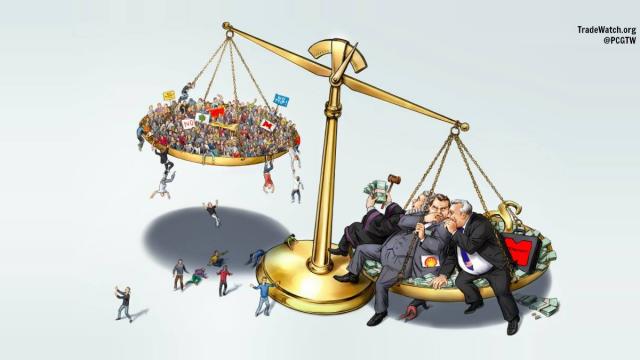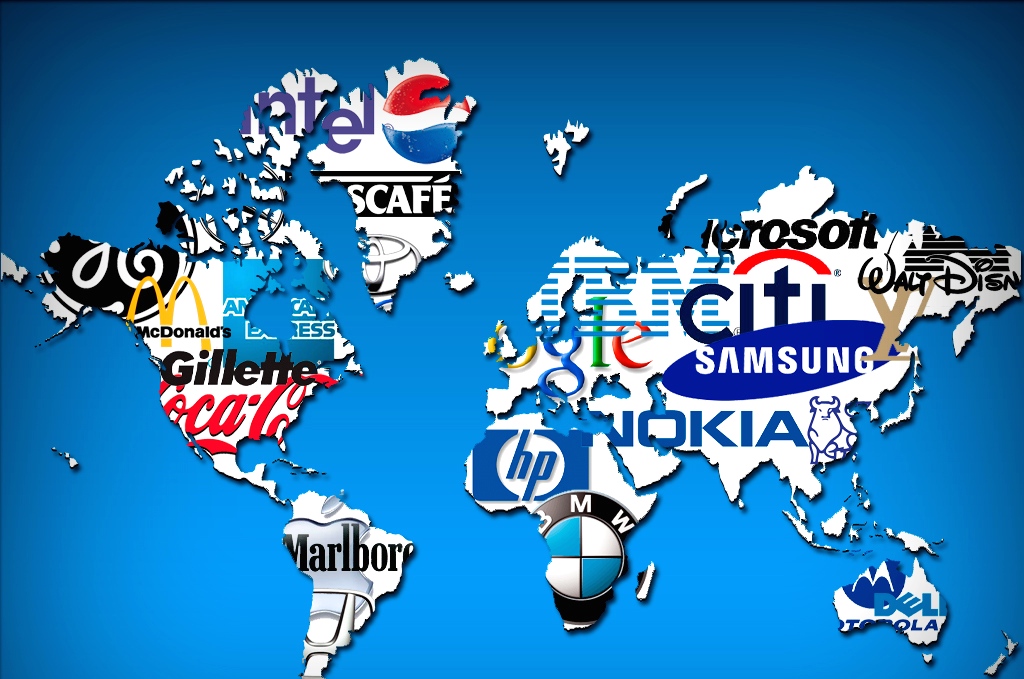Corporate Tribunals Pose Biggest Hurdle to Europe’s Vote on Transatlantic Trade Pact
ANGLO AMERICA, EUROPE, JUSTICE, TRADE, 3 Aug 2015
Tom Lawson, Occupy – TRANSCEND Media Service
28 Jul 2015 – July marked the second anniversary of negotiations between the U.S. and European Union over the proposed Transatlantic Trade and Investment Partnership (TTIP), but for the millions of European citizens opposed to the trade deal it was not a month to celebrate.
One of the main points of contention remains the debate about whether to include investor-state dispute settlements (ISDS) in the trade pact. The mechanism would allow corporations to sue governments if legislation is put in place, or altered, that could in any way negatively impact a company’s profits. This could include environmental protection laws, health and safety standards, workers rights or private services being made public.
So much public concern and controversy was raised over ISDS that the European Commission suspended talks on the investor protection rules in order to open a public consultation in spring of 2014. Considerations of ISDS are still suspended in the U.S.-EU negotiations – the 10th round of which took place earlier this month in Brussels, following a European Parliament vote that recommended the European Commission reassess the role of ISDS in the Transatlantic pact.
The Vote on ISDS-lite
Rather than a straight Yes/No vote on whether to include the corporate tribunals in TTIP, as some MEPs had proposed, the European Parliament voted on an amendment proposed by the Socialists and Democrats that claims to “replace the ISDS system with a new system for resolving disputes between investors and states.”
The recommendation to the European Commission called for a more “transparent” process, with “publicly appointed, independent professional judges in public hearings” to be used rather than private arbitration panels.
In a statement following the vote, EU Trade Commissioner Cecilia Malmström said that “TTIP will not in any way affect EU public services, nor will it in any way undermine the power of EU or national Parliaments. And it will certainly not undercut core EU legislation in areas such as food safety or environmental protection.”
Campaigners said the proposed changes – which passed with 436 in favor, 241 against and 32 abstentions – would be an improvement on “standard” ISDS practice, though the core aspects of ISDS would remain.
“These reforms are purely cosmetic,” said Anne Dänner of the campaign group Stop TTIP. “In essence, foreign investors are still to receive substantial additional rights compared with domestic companies and a parallel justice system to domestic courts to enforce these rights.”
Although the vote is non-binding, it has sent a clear message to the European Commission that MEPs believe this revised form of ISDS is acceptable to the citizens they represent. Yet 97% of the 150,000 EU citizens surveyed during the consultation process rejected the idea of including any version of ISDS in TTIP – not to mention 2.3 million people signing a petition to halt the negotiations altogether. So whose side are the politicians on?
The Rise of ISDS, Going Back Decades
ISDS agreements are already a part of many international trade deals around the world. They were initially established in the 1950s to ensure that companies were protected against unfair trials in countries with weak or corrupt legal systems, thereby encouraging foreign investment.
Many argue that ISDS would be unnecessary under TTIP since the U.S. and EU legal systems are already sufficient to deal with such cases. There’s also little evidence to show that a lack of ISDS has impacted investment between the two continents so far. If companies want further protections, they can purchase political-risk insurance that insures investments against future laws or regulations that could effect business.
For decades the inclusion of ISDS was seen as a diplomatic gesture of goodwill between the countries involved, and few claims were made. However, in the late 1990s the number of ISDS cases started increasing as lawyers saw the potential for companies to profit and change legislation in their favor.
With an ever growing set of regional trade treaties being signed, the number of ISDS cases has leapt more dramatically in recent years. According to the UN Conference on Trade and Development, by the end of 2014 a total of 608 known ISDS cases had been initiated. Among those, there were 58 in 2012, 57 in 2013 and 42 in 2014 – meaning a quarter of all ISDS cases ever started were in the past three years.
Of the 356 total concluded cases, 37% have been decided in favor of states, while 25% sided with investors and 28% settled. Meanwhile, legal costs for governments have amounted to an average of $4.5 million per case, funded with taxpayer money. Governments cannot sue companies in the same way, so the best they can hope for is not to lose.
If ISDS gets included in TTIP – which would create the largest single free trade zone in the world – the instances of companies suing governments will likely increase further still.
What Could Happen?
Recent cases highlight some of the impacts that ISDS could have on the U.S. and European states if included in TTIP:
- Deterring legislation that benefits people over profit.The government of Peru decided to shut down a metal smelter in La Oroya, one of the most polluted towns in the world, after U.S. company Renco Group delaying environmental improvements. However, the possibility of an ISDS case against themled the Peruvian government to allow the smelter to restart its zinc operations in 2012.
- An advantage for foreign companies.Following the Fukushima nuclear disaster in Japan in 2011, the German government decided to phase out nuclear power. As a result, Swedish state-owned energy company Vattenfall sued the German government for loss of profits, based on two nuclear power stations the firm co-owns with the German energy company E.ON. As a foreign company, Vattenfall could sue the German state using ISDS whereas E.ON could not, despite both companies losing potential profits.
- A lose-lose financial situation for governments.In 2004, Canadian mining company Pacific Rim applied to dig for gold in El Salvador. But with 90% of the country’s surface water already contaminated, the application was rejected and in 2008 the state introduced a moratorium on new mining permits. Pacific Rim has since claimed for a $301 million loss of potential profit, with a verdict expected later this year. The sum would amount to roughly 2% of El Salvador’s GDP. Even if the case is called in favor of the state, it has cost the government $13 million to date – almost as much as the country’s entire environment and natural resources budget.
Next Steps
Such cases have fueled widespread and growing opposition to TTIP across Europe. Along with negative public response to the recent consultation on ISDS, demonstrations have occurred throughout the continent since negations began. Yet when given the chance to voice citizen concerns, European politicians have often been seen as doing the opposite. “The European Parliament failed citizens in the TTIP vote,” said Anne Dänner of Stop TTIP. “They were completely ignored.”
The 11th round of TTIP negotiations are set to take place in the fall, when discussions of ISDS inclusion are expected to begin again and perhaps will take into consideration the recent vote. EU Trade Commissioner Cecilia Malmström said: “Parliament’s call for a new system must be heard, and it will be.” But campaigners along with millions of European citizens will be hoping that ISDS, if not TTIP itself, is instead dropped altogether.
DISCLAIMER: The statements, views and opinions expressed in pieces republished here are solely those of the authors and do not necessarily represent those of TMS. In accordance with title 17 U.S.C. section 107, this material is distributed without profit to those who have expressed a prior interest in receiving the included information for research and educational purposes. TMS has no affiliation whatsoever with the originator of this article nor is TMS endorsed or sponsored by the originator. “GO TO ORIGINAL” links are provided as a convenience to our readers and allow for verification of authenticity. However, as originating pages are often updated by their originating host sites, the versions posted may not match the versions our readers view when clicking the “GO TO ORIGINAL” links. This site contains copyrighted material the use of which has not always been specifically authorized by the copyright owner. We are making such material available in our efforts to advance understanding of environmental, political, human rights, economic, democracy, scientific, and social justice issues, etc. We believe this constitutes a ‘fair use’ of any such copyrighted material as provided for in section 107 of the US Copyright Law. In accordance with Title 17 U.S.C. Section 107, the material on this site is distributed without profit to those who have expressed a prior interest in receiving the included information for research and educational purposes. For more information go to: http://www.law.cornell.edu/uscode/17/107.shtml. If you wish to use copyrighted material from this site for purposes of your own that go beyond ‘fair use’, you must obtain permission from the copyright owner.
Read more
Click here to go to the current weekly digest or pick another article:
ANGLO AMERICA:
- Trump, Epstein and the Deep State
- 'An Arsenal of Profiteering': Military Contractors Have Gotten Over Half of Pentagon Spending Since 2020
- Imperial Hypocrisy about “Terrorism” Hits Its Most Absurd Point Yet
EUROPE:
- Burying Genocide: The BBC, Gaza and the Role of the UK
- Raised in a Colonial Death Cult: 600 Years of KU Leuven and still...
- The Rise of ‘Antidiplomacy’ in a Powerless Europe
JUSTICE:
- Report: 60,000 Political Prisoners Held without Trial in Egypt
- Gaza Tribunal Project: Opening Remarks
- The Sarajevo Declaration of the Gaza Tribunal (28 May 2025)
TRADE:

